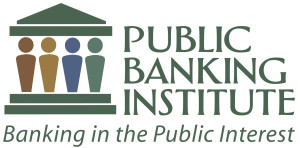
PUBLIC BANKING INSTITUTE NEWS: FEB 1, 2020
Academics and advocates share ideas at DC symposium on public banking
On Friday, January 24, Take on Wall St, a campaign of Americans for Financial Reform, hosted an illuminating symposium in Washington D.C. to examine public banking and related ideas that could transform our financial system. Among the wide-ranging proposals discussed were a plan for postal banking, individual Fed accounts, and a National Investment Authority that would create a “public Blackrock.”
Public banking successes and challenges were shared by Trinity Tran and David Jette of the California Public Banking Alliance and Ali Issa of Public Bank NYC. UC Irvine Law Professor Mehrsa Baradaran, a member of the Public Banking Institute Advisory Board, spoke about postal banking and how it could service the needs of the unbanked. In attendance and participating in the afternoon roundtable discussions were Thomas Hanna, another PBI Advisory Board member, as well as PBI’s Development Director Marc Armstrong and Communications Coordinator Suzanne O’Keeffe. More details and photos here.
[watch the full symposium (Facebook link)] [read more]David Dayen: Building the people’s banks
David Dayen writes in The American Prospect we do not need to endure an economy raided and starved by Wall Street self-interest. We know how to fix finance. We just need to do it. It is entirely possible to establish financial institutions and regulations that work for middle- and low-income Americans. He writes:
“So how can we fix this? It’s simple: we retain the parts of the banking system that are socially useful and necessary. We ensure equitable access to those tools, stepping in with nationalized solutions if the private sector cannot accomplish this. And then we flay the rest and toss it into the sea. …
“A bank built to serve the public can channel its resources to actual public needs. It can give the American people a defined voice in the direction of their money. Instead of being at the mercy of financiers, they’d be participating in a fundamentally democratic process.”
[read more]American Banker: Former Wells Fargo executives may face criminal charges in coming weeks after record civil fines
Underscoring the critical need for public bank alternatives to hold the public’s money, Kevin Wack reports in American Banker that indictments are expected as soon as this month for former Wells Fargo executives under criminal investigation in connection with the bank’s fake-accounts scandal. Last week, the Office of the Comptroller of the Currency (OCC) brought the civil hammer down. Jeff Spross reports in The Week that Wells’ former CEO John Stumpf will pay a $17.5 million personal fine — the biggest penalty the OCC has leveled against an individual — and has agreed to a lifetime ban from the banking industry. Spross writes:
“The OCC released a massive 100-page legal brief detailing how Wells Fargo’s demands and sales goals, imposed by the higher-ups, turned the bank into a thunderdome for ‘hundreds of thousands’ of mid- and low-level employees. They basically had to either rip off customers, or be fired.”
The OCC found in a subsequent broad investigation of more than 40 banks that this was a system-wide problem — many other banks were creating fake accounts without customers’ consent — but chose to hide those results from the public.
[read more]IMF acknowledges that banks create money out of the blue
In late December, the International Monetary Fund (IMF) published a working paper entitled Money Creation in Fiat and Digital Currency Systems confirming what the Bank of England admitted in 2014 and PBI Chair Ellen Brown has been arguing for over a decade: banks create new money when they make loans. The IMF working paper links the discussion to the emergence and design of central bank digital currencies (CBDC), with a special focus on how loans would be granted in a CBDC world.
[read the paper]